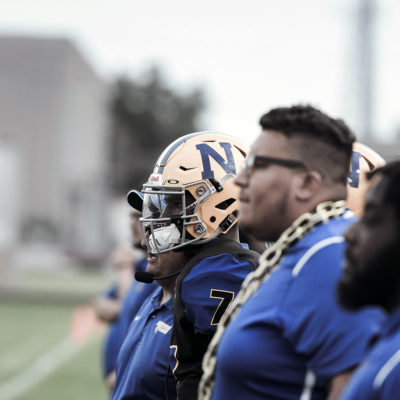The Me in Team

Athletes have always been a vessel for our own personal hopes and dreams, a mirror in which we seek to reflect our own morals and ethics. But what happens when the mirror becomes a looking glass, and our heroes challenge the myths that we create for them?
We’ve always wanted to be like Mike.
Since the first Olympic games, we’ve wanted the athletes we support to be like us, and we’ve wanted to be like them. We impart our own hopes and dreams onto their shoulders, and their on-field actions and success dictate our own in profound ways[1].
Our devotion to these individuals is quasi-religious. The word fan, after all, is derived from the latin fanaticus, meaning “of or related to a temple[2].” By elevating these actors to god-like status, we’ve created myths to allow us to feel connected to the greatness of their performance. These myths subsume athletes’ individual identities in favor of those that we project onto them, and often bypass or ignore the myriad ways in which their journeys to stardom, and the sports they play, can reflect the very worst aspects of our society and our world.
This selective application of our ethics and morals to sports may be changing, however. The last year has seen many of the previous distinctions in our lives, between work and play, physical and digital, and home and office, fade. Our reinvention of routine and habit has helped make space for a growing awareness of the other distinctions shaping every aspect of our world, whether racial, social, political, or economic. As a result, our ability to selectively disconnect and connect has decreased. We strive for distraction, but also need safety, both emotional and physical, to truly “power off.” We crave community, but need to feel welcomed and accepted as individuals to be able to fit in and “power on.” Our shifting norms are changing our relationship with athletes, as we are increasingly willing to replace the stories that we’ve projected onto our heroes with their own authored narratives, which reflect the totality of their experiences and their identities.

Athletes have taken notice of this shift. Athlete activism is not a new phenomenon, and If anything, athletes have long been restricted in these efforts by the limits of fans and society’s willingness to engage on these topics. As the reach of their platforms grows, however, athletes are increasingly building authentic and un-apologetic brands built on purpose. Marcus Rashford’s efforts to eliminate child hunger in the United Kingdom reflect his childhood experience with poverty, and an acknowledgment of his unique position as a celebrity to effect change in this space[3]. Naomi Osaka has used her standing as tennis’ burgeoning superstar to both call attention to endemic and systemic racism on the court, while also fighting for gender equality in sports through her ownership of The North Carolina Courage. Perhaps the greatest racecar driver of all time, Formula 1’s Lewis Hamilton, summarized the power of his platform and brand succinctly at the end of the latest season of Netflix’s Formula 1: Drive to Survive: “I’ll be damned if I’m gonna win all these championships and have all this success and not…use it to make change.”
The momentum of change does not eliminate risks for the athletes and the brands that choose to take a stand. From Serena Williams to Raheem Sterling, from Michael Sam to Chloe Kim, athletes still face backlash for their willingness to speak up and proudly express their own identities. Nor do all athletes even want to speak out — Zlatan Ibrahimovic’s recent comments on athletes sticking to sports reflect the plurality of athletes’ views on the topic.
Nonetheless, athletes are increasingly seeing their own focus on purpose allow them to engage fans in new ways, and stretch into new categories. Lebron James exemplifies a personal brand that easily, and vocally, transcends traditional barriers. Through the I Promise School, SpringHill Entertainment, The Shop, and an ownership stake in Liverpool Football Club, Lebron James has built a brand with global appeal, that allows him to move off the court to credibly play a role as a media mogul, owner, and educator, all in the context of his central role as an activist. The central factor making such scalability feel seamless is the unapologetic authenticity that he embeds into every move. From the I Promise School firmly connecting Lebron to his hometown, to the honest discussion elevated by The Shop, Lebron is a salient reminder that authenticity is key to an elastic brand.
This authenticity is allowing athletes to emerge as catalysts in not only their own brand transformation, but also that of their employers. In 2020, NASCAR decided to ban Confederate flags following the killing of George Floyd—and the activism of star driver Bubba Wallace. Driven by vocal athlete blocs, the NBA and WNBA elevated the Black Lives Matter movement and the importance of voting into the forefront of their return to play models. In one of the most striking examples of shifting norms inside the arena, the Atlanta Dream, a team whose very name pays homage to Martin Luther King Jr.’s vision of racial equality, captured headlines when its players’ stand against racial injustice and gender inequality evolved into active support for United States Senator Raphael Warnock, who successfully ran for office against the Dream’s then owner, Kelly Loeffler. Renee Montgomery, one of the Dream’s leading voices for change, is now a co-owner of the team.
This summer will see the release of Space Jam: A New Legacy, a sequel to the original film that helped Michael Jordan strengthen his global brand twenty-five years ago. On the surface, the decision to feature Lebron James instead of Jordan as the protagonist reflects LBJ’s status as his generation’s leading player. At a deeper level it also marks an important shift in the how we view athletes in society.
In 1990, Michael Jordan declined to publicly endorse Democratic candidate Harvey Gantt in the contentious Senate election in his home state of North Carolina, famously quipping “republicans buy sneakers, too.” While Jordan did provide a financial contribution to Gantt, and maintains that the comment was made in good fun[4], the implications are clear. For Jordan, wading into politics wasn’t a winning play.
Contrast that with Lebron James, whose vocal foray into politics, through the creation of the More than a Vote organization and recent comments on voting legislation[5], is both authentic and highly strategic. Such moves would have likely hurt Jordan’s brand thirty years ago. For Lebron, these purpose-led actions have accelerated his brand’s growth, and provided him with even greater platforms for exposure. For athletes across the spectrum, then, the opportunity to build a purpose-led brand, and the impact it can generate, has never been greater.
A New Legacy, indeed.
[1] https://www.inquirer.com/health/self-esteem-sports-fans-college-football-teams-ohio-state-michigan-eagles-sixers-20190222.html
[2] https://www.merriam-webster.com/dictionary/fanatic#:~:text=The%20Latin%20adjective%20fanaticus%2C%20a,by%20a%20god%20or%20goddess.
[3] https://time.com/5903453/marcus-rashford-child-food-poverty/
[4] https://theundefeated.com/features/we-finally-have-answers-about-michael-jordan-and-republicans-buy-sneakers-too/
[5] https://www.google.com/search?q=more+than+a+vote+lebron+atlanta+elections+202&sxsrf=ALeKk02OFoD-aTQHxWcN0AOwv0GgBLbf4A%3A1618600332164&ei=jOF5YOqgCeWg5NoPx4a1-AQ&oq=more+than+a+vote+lebron+atlanta+elections+202&gs_lcp=Cgdnd3Mtd2l6EAM6BwgAEEcQsANQ-xpYzB9g7SBoAXACeACAAacCiAH_CZIBBTMuMy4ymAEAoAEBqgEHZ3dzLXdpesgBCMABAQ&sclient=gws-wiz&ved=0ahUKEwjqltOOvIPwAhVlEFkFHUdDDU8Q4dUDCA4&uact=5